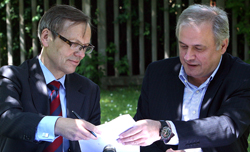
Self-regulation – at last

Nils Ragnar Kamsvag, Norwegian ambassador to Serbia and Dragan Bujošević, Press Council President (FoNet)
The Press Council with its administration and the Complaints Committee have been established, after a process that took more than two years. The public contest for appointment of the secretary general of the Council is also nearing completion. Crucial assistance in the form of advice was offered by the Association of Journalists of Norway and the Norwegian Press Council, while the government of this close country has donated significant amounts of their tax-payers' money to be used for the activities of the Serbian Press Council.
The media in Serbia have been treated harshly for years, and legal suits against the media – mostly the press – for libel and insults have become a common practice that regularly includes requests for enormous damages for emotional pain.
Ethical standards and self-regulation in the field of journalism are primarily intended to protect individuals from insulting and damaging publicity. The Complaints Committee of the Press Council will deal precisely with such disputes.
Decisions about disputed articles made by the Press Council in favor of complainants will not oblige the press editorial offices to pay any financial damages. If an editorial office violates the journalistic code of conduct, the Press Council will decide that the media outlet is required to publish an announcement admitting a professional mistake. The complainant will have a satisfaction for the caused damage, while the media outlet is forced to admit a mistake to its readers – which painfully erodes its professional credibility.
This is the way in which disputes are solved in democratic countries between editorial offices and individuals who are convinced that a newspaper or a magazine has published untrue information about them. In Serbia, such disputes are usually solved by courts on two different bases: with regard to intangible damages on the basis of the Law on Public Information, and with regard to culpability for published libel or insult. In the first case, if an editorial office loses the case, it is obliged to pay a financial damage to the complainant for suffered emotional pain, while in the second case it has to pay a financial fine to the state.
Although prison sentences for published libel or insults have been eliminated from Serbian legislation under pressure from the European Union, our judiciary has managed to find a way to imprison journalists. If a journalist or an editor fails to pay the prescribed financial fine, the court will exchange it with a prison sentence by replacing each 1,000 dinars for one day in prison. Therefore a fine amounting to 100,000 dinars could be exchanged for a 100 days in prison. But the current judicial practice has shown that fines totaling 100,000 dinars are at the lower end of the scale when it comes to punishing journalists.
In countries that are members of the European Union, the legal practice has proved that media-related disputes are usually solved by press councils. Complainants rarely decide to initiate court proceedings after failing to prove before the Complaints Committee that an editorial office had violated the journalistic code of conduct. This is probably supported by the fact that courts in these countries take into account decisions made by press councils and consider them to be expert opinions. In such cases, if journalistic code of conduct has not been violated, there cannot be any legal basis for libel or insult.
Undoubtedly, the formation of the Press Council in Serbia will be welcomed by print media outlets who have been involved in numerous legal proceedings – and lost most of them.
A major step forward would be if the Council, as an arbitration body, was accepted by those who consider themselves to be damaged by press reports. Serbian judiciary would make a very noticeable step forward if it accepted the Press Council as a professional body whose opinions should be taken into account. It would be a most welcome development if the activities of the Press Council were supported by the media industry i.e. by major and most influential publishers – those who often disregard professional standards while trying to achieve wider circulation or to win a better position in the market.
Finally, those professionals working for the print media who have any reservations toward the Press Council as a self-regulatory body for the print media should ask their colleagues from the electronic media about their experience with the Republic Broadcasting Agency and the Republic Agency for Electronic Communications, and the better solution will be evident. Namely, these "independent" regulatory bodies have been established by the state.
Stojan Markovic
MC Newsletter, May 20, 2011
View all comments (0) Leave a comment
Published comments contain opinions that are not the opinions of Media Center. Responsibility for the content of messages and their accuracy lies on the website users who posted them.
 |
| The content of this article does not necessarily reflect the view of the Media Center. The author bear full responsibility for the content of the text. |







